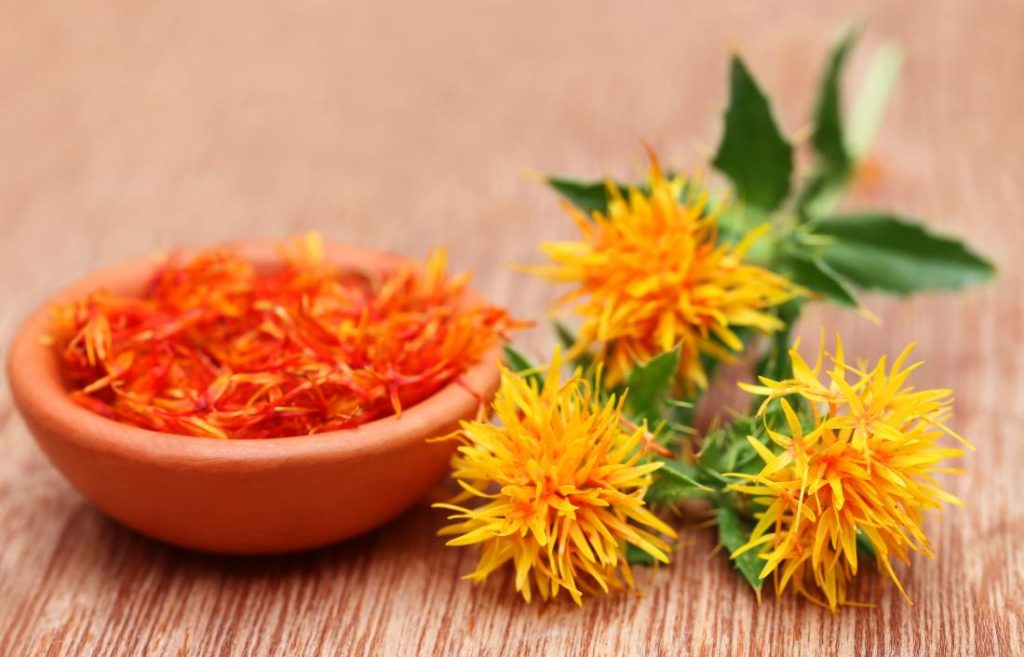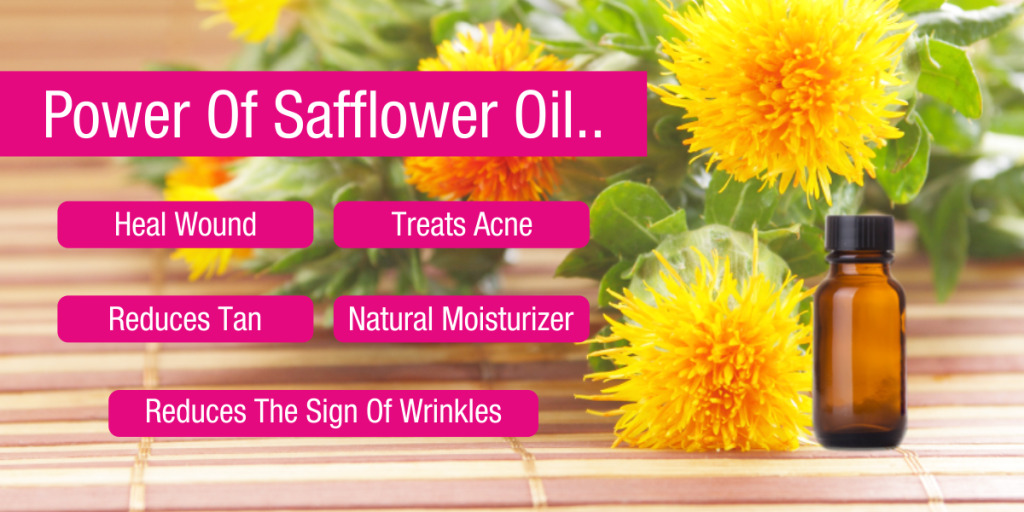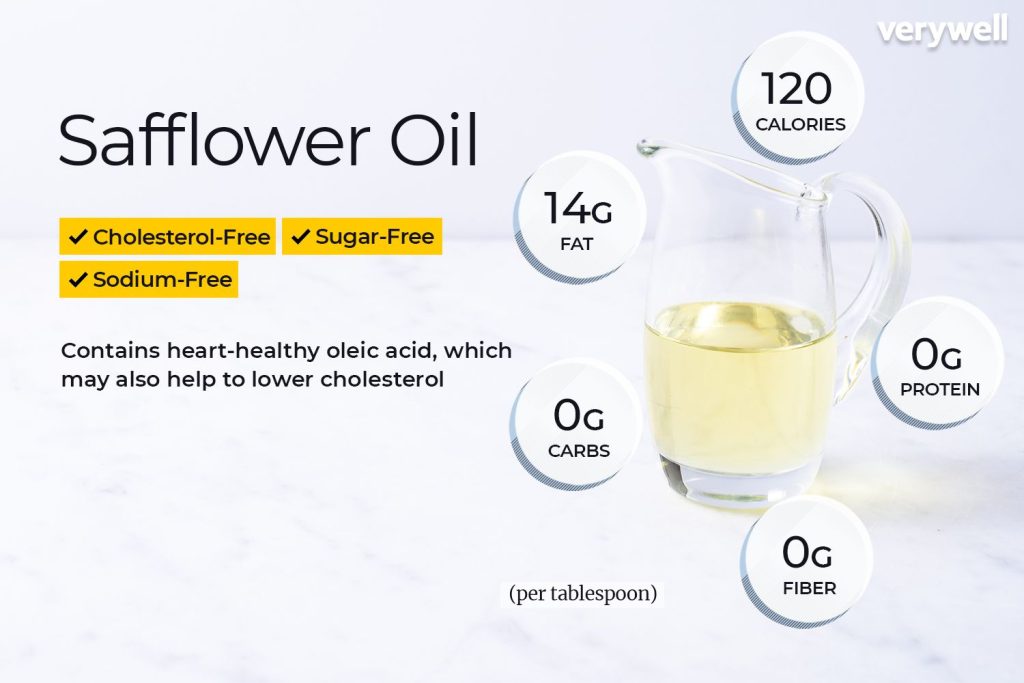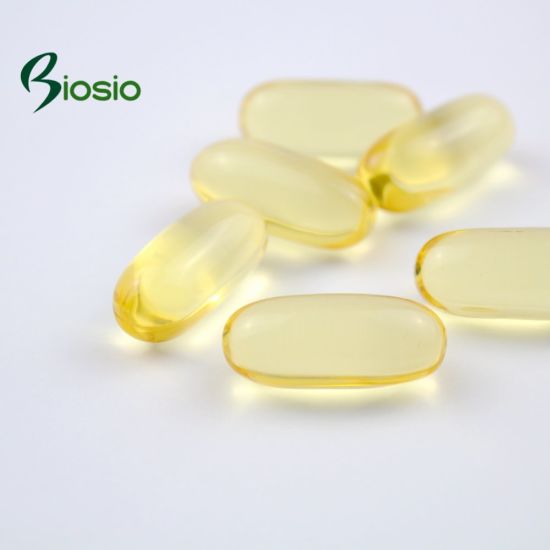Prevent Heart diseases and Stroke using Safflower Oil.
Safflower

Safflower, scientifically known as Carthamus tinctorius L,is a thistle-like plant that is native to China, Egypt, Iran, and India. However, this plant is cultivated all over the world, mainly for oils and also as animal feed. It is the member of Asteraceae family of plant which is available in two varieties namely:
- High-linoleic safflower- oils are rich in polyunsaturated fats
- High-oleic safflower- oils are rich in monounsaturated fats
Out of the two, high-oleic kind is the most common safflower oil available in the market. It is commonly used as frying oil for several fried food products such as chips, french fries, etc.
The oil of safflowers are generally composed of fat with very few other vitamins and minerals. It is mainly composed of Oleic and linoleic acids which makes upto 90% of safflower oils and remaining 10% are made by other saturated fatty acids such as palmitic and stearic acid.
Safflower is also used as a coloring ingredient in cosmetics and dye fabrics. Also, its seeds are used as a solvent for paint.

Apart from its cooking and coloring applications, safflower oil is used in treating a number of medical conditions of a human body. Although there is not enough evidences to support its applications, safflower has been effective in treating several medical conditions such as:
- high cholesterol
- stroke
- heart disease
- diabetes
- skin inflammation
- high blood pressure
- cough
- fever
- constipation
- chest pain
- traumatic injuries
- pain
- blood circulation disorder
- breathing problems
- Hepatitis
- Cystic fibrosis
- abortion
Benefits of using Safflower
In addition to its several features associated with flavoring and edible properties in a number of dishes, safflower consist of several essential health benefits that provides enough evidence for its wide medical application in a human body when taken in its any form that includes:
- rich source of fatty acids
- lowers cholesterol
- tackles inflammation
- safe for high temperature cooking
- improves blood sugar level
- improves skin health
- assist weight loss
- improves heart health
- prevents Atherosclerosis
- reduces risk of internal blood clots
- relieves itching
- prevents symptoms of Premenstrual Syndrome
- helps in healing wound
There might be several other benefits of Safflower in addition to those mentioned above. Also, these benefits are obtained due to several residing vitamins and minerals extracted by human body from this substance such as:

- Vitamin E
- Fat
- calcium
- energy
- carbohydrates
- protein
Safflower Supplement

Safflower supplements are herbal medicines that are generally used to obtain several beneficial medical properties of natural Safflower. In addition to this, there are several high potential healing composites that provide supportive or additional medical properties along with Safflower. These herbal supplements are available in different forms such as pills, soft capsules, oil, etc. The dosage is based on an individual’s age, medical condition, diet, and other circumstances. It is advisable to consult a doctor before consuming such a supplement to avoid any kind of complication with the body’s health in future.
Safflower dose for Humans
Safflower is not a kind of mineral content that a human body needs daily to perform certain tasks which could only be pulled out by it. The dosage is based on an individual’s age, medical condition, diet, and other circumstances. People generally consume safflower to treat several medical conditions or gain several medical properties.
There is no clinical evidence that specifically supports an appropriate amount of oral dosing of safflower in a human body. It is generally advisable to consult a doctor or a health professional and follow their prescription if you are taking an additional safflower supplement for any reason. Generally, natural substances are considered safe but must be consumed under certain provisions as their safety is not assured.
REFERENCES:
- https://www.webmd.com/vitamins/ai/ingredientmono-96/safflower
- https://www.medicalnewstoday.com/articles/322245#safflower-oil-for-weight-loss
- https://www.rxlist.com/safflower/supplements.htm
- https://www.ncbi.nlm.nih.gov/pmc/articles/PMC5984022/
- https://www.healthline.com/health/safflower-oil-healthy-cooking-oil#other-uses
- https://m.made-in-china.com/product/Natural-Safflower-Seed-Oil-Supplement-Softgels-760817622.html
- https://www.verywellfit.com/safflower-oil-nutrition-facts-and-health-benefits-4164403
For more details, kindly visit below.